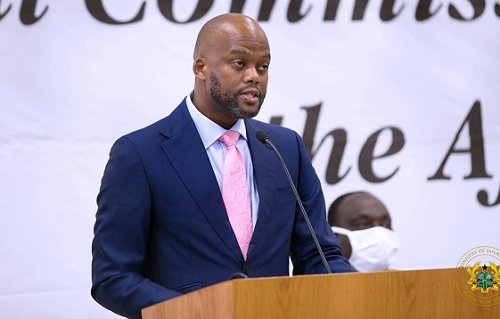The Secretary-General of the African Continental Free Trade Area (AfCFTA) Secretariat, Wamkele Mene, has asked African countries to leverage the platform provided by the trade pact to create regional trade networks and global affiliations.
He said this would enable their markets to build resilience in the supply chains and reduce reliance on external markets.
The COVID-19 pandemic has provided us a once in a lifetime opportunity to make bold decisions that will put us on a path to resilient, inclusive and sustainable economic recovery, he said at the opening of the 13th World Trade Promotion Organisations (WTPO) conference in Accra on May 17.
“With the AfCFTA, Africa now has an important instrument to assist countries to look inward for solutions to their COVID-19 economic challenges,” he stressed.
The two-day event is being organised by the Ghana Export Promotion Authority (GEPA) and the International Trade Centre (ITC) on the theme: “Bold Solutions for Resilience and Recovery.”
Mene noted that the conference came at a time when countries were recovering from the pandemic, a development, he said, had impacted economies and triggered the sharpest recession in over 25 years, and halted critical gains made in reducing poverty in Africa.
Indications are that the recovery will be an arduous and complex process as there are still many uncertain and changing factors, including Russia-Ukraine conflict, which has created new concerns.
“Now is the time to rebuild our economies and secure Africa’s future,” he said.
Consolidate gains
In a speech read on his behalf by the Minister of Trade and Industry, Alan Kyerematen, President Nana Addo Dankwa Akufo-Addo said in order to get back on track following the hard knocks suffered from post COVID-19 pandemic and Russian-Ukraine adversities, the government would continue to work hard to address the issues the country faced.
He said it would undertake difficult but necessary fiscal policies and measures to consolidate fiscal gains made from last year and engender higher growth rates to create further job opportunities.
In 2021, Ghana’s economy grew at a provisional rate of 5.2 per cent in the first three quarters. Over the past year, my government has implemented a number of policies and programmes to accelerate our economic recovery from the ravages of COVID-19. We have introduced measures to improve fiscal consolidation, and ensured debt sustainability.
“I am confident that for micro, small and medium enterprises (MSMEs), especially, the implementation of the government’s GH¢100 billion Ghana CARES Obaatanpa Programme will facilitate a faster rebound,” he said.
The Executive Director of the ITC, Pamela Coke-Hamilton, said the activities of small and medium enterprises (SMEs) had been damaged in the last two years.
As a result, it was critical for trade promotion organisations (TPOs) to examine the challenges and find ways to enhance the long-term impact for sustainable growth and sustainable development.
She said the trends of COVID, climate change and the Russia-Ukraine conflict had implications worldwide in terms of food security, finance and fuel cost.
These are all major developments that have overwhelmed us and if we take it all in the same breath we won’t be able to do match. So, it is about breaking those down, taking them apart and beginning to look at strategic ways in which TPOS, like yourselves, can actually help SMEs to survive,” she said.
GEPA
For her part, the Chief Executive Officer of GEPA, Dr. Afua Asabea Asare, said the authority, as an agency of MoTI, was committed to supporting small businesses build on their capacities and develop the kind of resilience that would enable them to compete favourably on international markets.
She said that the success of Ghana’s National Export Development Strategy, launched in 2020 under the auspices of MoTI to achieve export earnings of $25.3billion by 2029, was based on three significant pillars.
These are; Boosting productivity levels of exports: Creating an enabling business environment to encourage increased exports: and Building the capacity of persons in the value chain of exports to enable them to compete favourably in international markets,” she said.
Increasing trade
A memorandum of understanding was later signed between the AfCFTA and the ITC to deepen collaborations to help small business to grow and to increase global trade.
